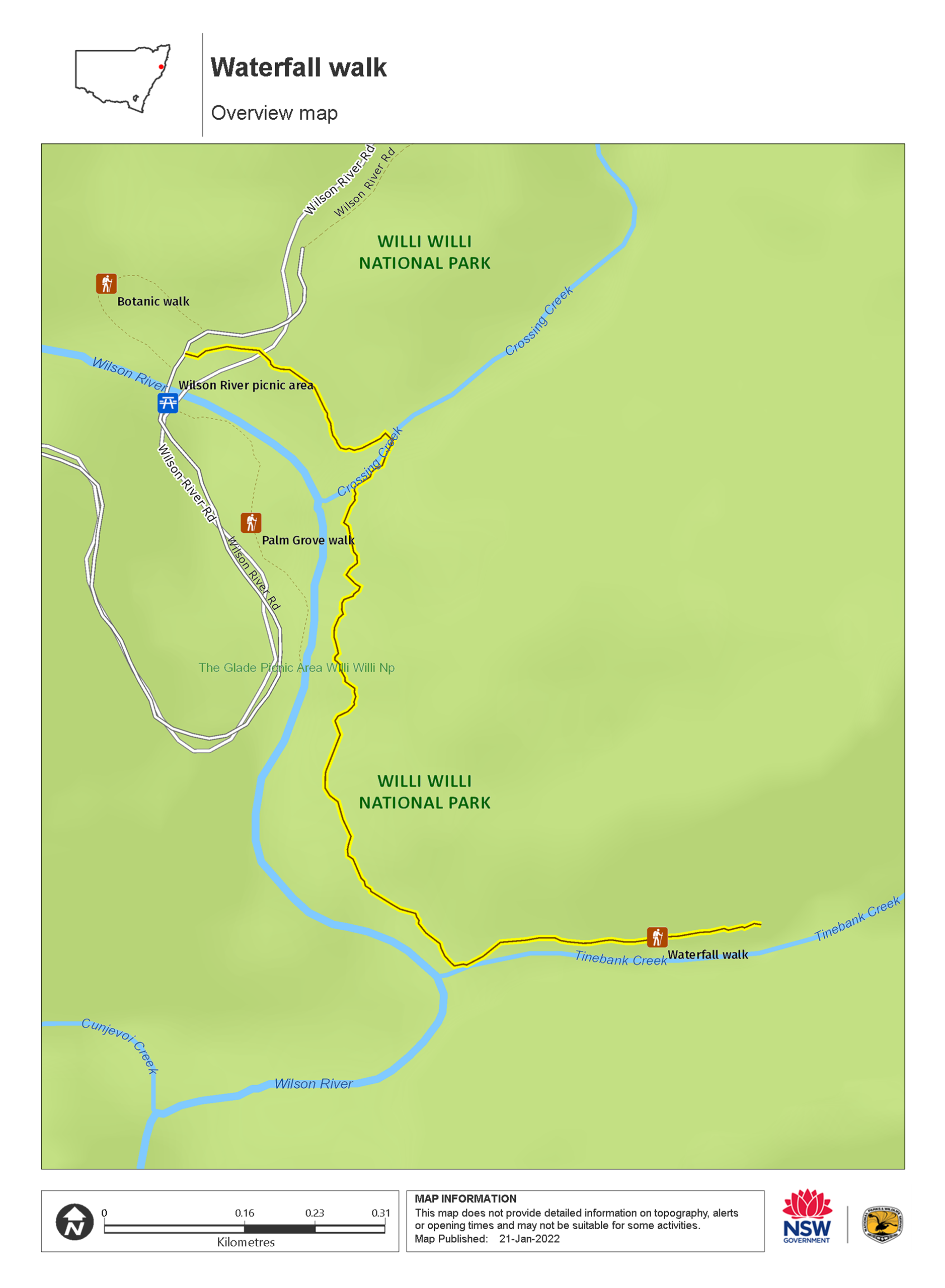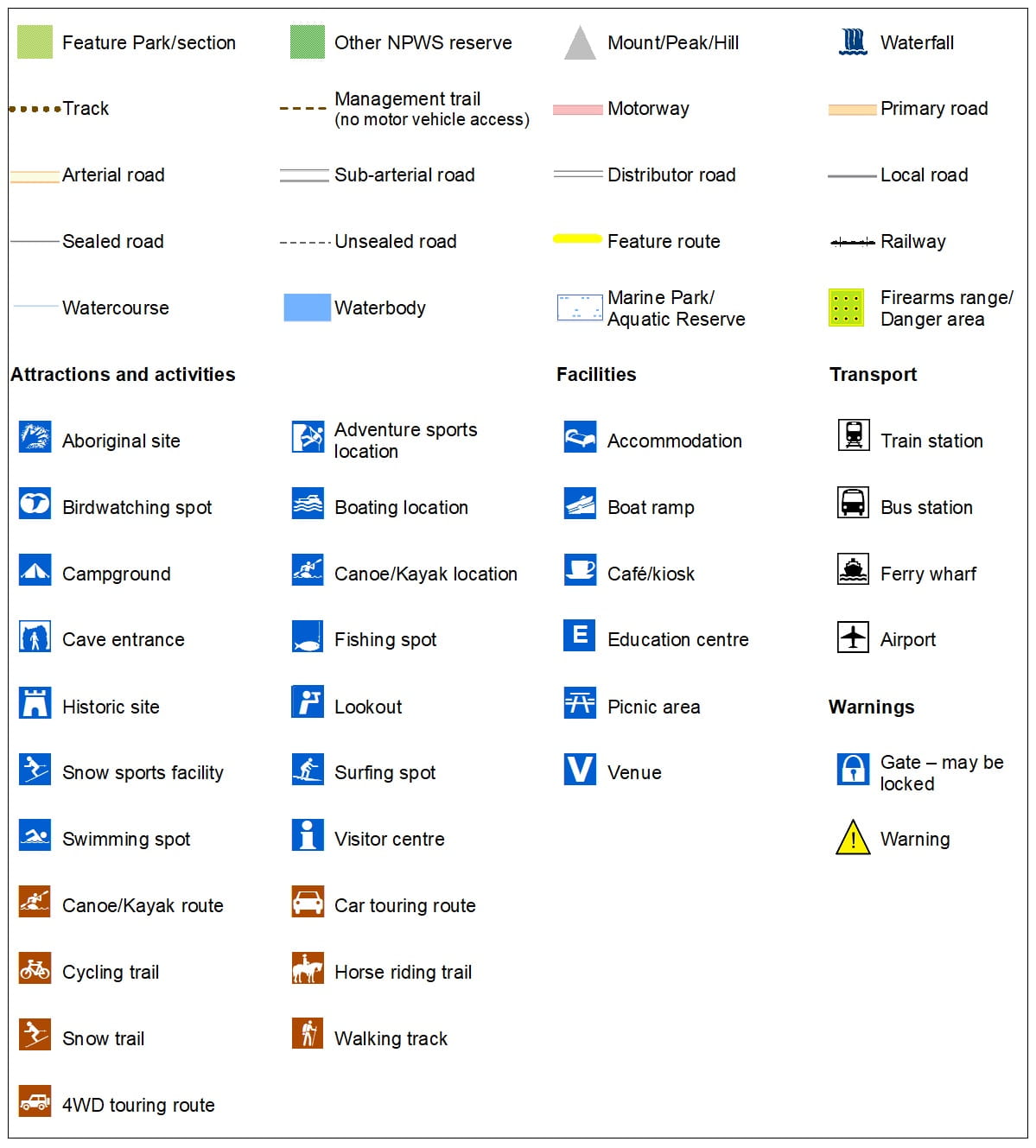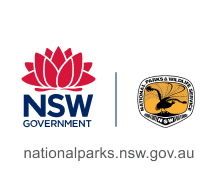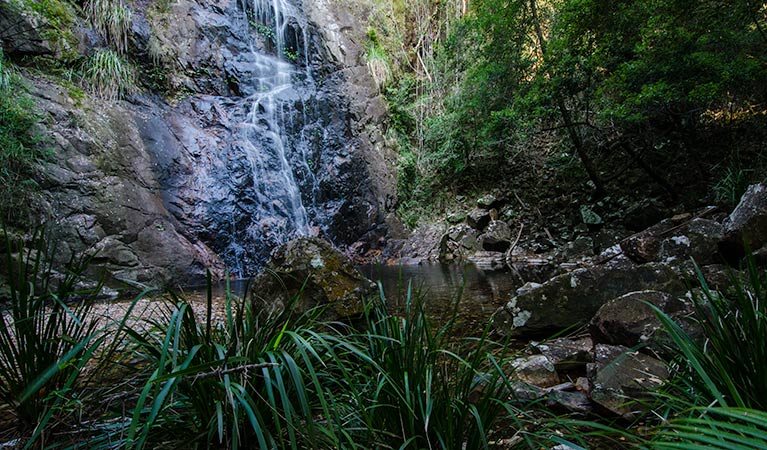Waterfall walk
Willi Willi National Park
Overview
This medium-difficulty trail, not too far from Kempsey, walks you through flourishing World Heritage-listed rainforest of Willi Willi National Park. You can also picnic by waterfalls and swim in a natural pool.
- Where
- Willi Willi National Park in North Coast, Country NSW
- Distance
- 3km return
- Time suggested
- 1 - 2hrs
- Grade
- Grade 3
- What to
bring - Hat, sunscreen, drinking water
- Please note
- There is limited mobile reception in this park
- Remember to take your binoculars if you want to birdwatch
On Waterfall walk you’ll pass a magnificent strangler fig, through sub-tropical and warm temperate rainforest, to a sparkling waterfall and plunge pool where you can cool off with a refreshing swim after your walk.
Glossy green palms, brightly coloured fungi and delicate orchids line your path, and there are informative signs for those interested in the history of the area. Swimming is encouraged during your visit - the fertile rainforest ensures a warm, humid climate throughout the year, and the waterfall pool is an idyllic place to cool off on a warm day.
This medium difficulty walk leaves from Wilson River picnic area, where comfortable amenities include a shelter shed with large picnic tables for a relaxing barbecue. Easier trails like the scenic Botanic walk and Palm Grove walk also begin from here for those looking for a more casual post-picnic stroll.
Map

Map legend

Local alerts
For the latest updates on fires, closures and other alerts in this area, see https://www.nationalparks.nsw.gov.au/things-to-do/walking-tracks/waterfall-walk/local-alerts
General enquiries
- National Parks Contact Centre
- 7am to 7pm daily
- 1300 072 757 (13000 PARKS) for the cost of a local call within Australia excluding mobiles
- parks.info@environment.nsw.gov.au
Park info
- in Willi Willi National Park in the North Coast and Country NSW regions
Willi Willi National Park is always open but may have to close at times due to poor weather or fire danger.
Visitor info
All the practical information you need to know about Waterfall walk.
Maps and downloads
Learn more
Waterfall walk is in Willi Willi National Park. Here are just some of the reasons why this park is special:
An ancient story

Today’s lush rainforests are direct relations of the ancient forests of Gondwana within the Antarctic Circle. Around 80 million years ago, the ancestral continent broke up and Australia started moving north, which eventually reduced most of the rainforests to a narrow strip along south-eastern Australia. As well as World Heritage-listed rainforests, the park protects a diversity of vegetation, including old growth eucalypt forests and open heath. This diverse vegetation provides food and shelter for a medley of creatures; small ground mammals and bats, the endangered Hastings River mouse, the yellow-bellied glider. Australia’s largest marsupial carnivore, the spotted-tailed quoll, also calls Willi Willi home.
- Botanic walk A short stroll not far from Wauchope, Botanic walk heads through World Heritage rainforest and is great for birdwatching and relaxing with the family over a picnic.
Ground beneath our feet

The geology of Willi Willi National Park is for the most part mudstone, sandstone and conglomerate, making the terrain exceptionally steep and rugged. These rocks are more resistant to erosion than the sedimentary beds, making them the cause of such rippled landscapes and the spectacular angles of the park.
- Hastings Forest Way touring route See Gondwana rainforest, go camping, birdwatching and enjoy amazing scenery on a scenic drive through Hastings Forest Way touring route near Port Macquarie and Wauchope.
- Waterfall walk This medium-difficulty trail, not too far from Kempsey, walks you through flourishing World Heritage-listed rainforest of Willi Willi National Park. You can also picnic by waterfalls and swim in a natural pool.
- Wilson River picnic area Wilson River picnic area near Wauchope is the ideal place to begin your driving or walking adventures. Bring a picnic, explore rainforests on a walking track and swim near the waterfall.
The land provides balance

The name Willi Willi National Park is derived from the local Dunghutti Aboriginal word 'willai' meaning possum. The repetition of the word indicates a plural form translating roughly as “many possums”. Dunghutti Aboriginal Nguloongooras (wise elders) would perform secret ‘increase rituals’ on sacred mountain tops such as Kemps Pinnacle, near the western boundary of the park, to extend their food supply. Placing limits on certain species during seasonal variations allowed for a natural increase in food resources. It was the wish of their great deity, Woormprahl, for them to create this balance with nature.
Education resources (1)
General enquiries
- National Parks Contact Centre
- 7am to 7pm daily
- 1300 072 757 (13000 PARKS) for the cost of a local call within Australia excluding mobiles
- parks.info@environment.nsw.gov.au
Operated by
- Kempsey office
- Monday to Friday, 9am to 4.30pm.
- 02 6561 6700
- npws.hastingsmacleay@environment.nsw.gov.au
- 247 Old Station Rd, Verges Creek NSW 2440
Park info
- in Willi Willi National Park in the North Coast and Country NSW regions
Willi Willi National Park is always open but may have to close at times due to poor weather or fire danger.

